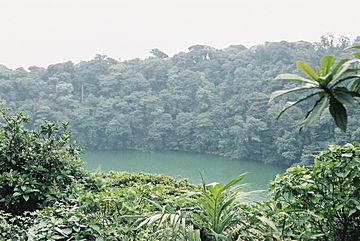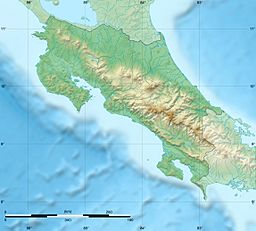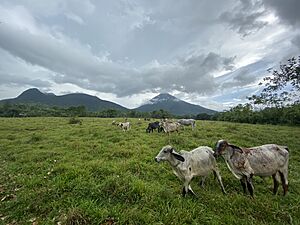Chato Volcano facts for kids
Quick facts for kids Chato Volcano |
|
|---|---|

Crater Lake of Cerro Chato
|
|
| Highest point | |
| Elevation | 1,140 m (3,740 ft) |
| Geography | |
| Parent range | Guanacaste Cordillera |
| Geology | |
| Mountain type | Stratovolcano |
| Last eruption | ~3500 years ago |
Chato Volcano, also known as "Cerro Chato" (which means "Flat Hill" in Spanish), is an inactive volcano. It's located in northwestern Costa Rica, near the city of San José. You can find it in the Alajuela province, specifically in the San Carlos canton and La Fortuna district. It sits southeast of the famous Arenal Volcano.
Contents
What is Chato Volcano?
Chato Volcano is an old volcano that is no longer active. It's sometimes called Cerro Chato, meaning "Flat Hill." This volcano is found in the beautiful country of Costa Rica. It's close to the well-known Arenal Volcano.
History of Chato Volcano
Scientists believe Chato Volcano first erupted about 38,000 years ago. Its last eruption happened around 3,500 years ago. One of the old lava flows from Chato Volcano now forms the path for the amazing La Fortuna Waterfall.
Features of Chato Volcano
Chato Volcano has two main peaks. These peaks are named Chatito, which means "little Chato," and Espina, meaning "thorn." The volcano also has a large crater that is about 500 meters (1,640 feet) wide. This crater is filled with green water, creating a beautiful lake called Laguna Cerro Chato.
Why Can't You Hike Chato Volcano?
The government of Costa Rica has made it illegal to hike to the top of Cerro Chato. This rule was first put in place in 1998. However, it was not strictly enforced until 2017. Before that, many hikers and tour groups would visit the volcano.
Why the Trail is Closed
The main reason for closing the trail is to protect the environment. Hiking on the volcano was causing damage to the natural area. The trail was also considered very difficult. It was only recommended for people who were in excellent physical shape. When it rained, the path became very muddy and slippery. This made it even more dangerous, especially when trying to go down into the crater.
See also
 In Spanish: Volcán Chato para niños
In Spanish: Volcán Chato para niños
 | John T. Biggers |
 | Thomas Blackshear |
 | Mark Bradford |
 | Beverly Buchanan |



